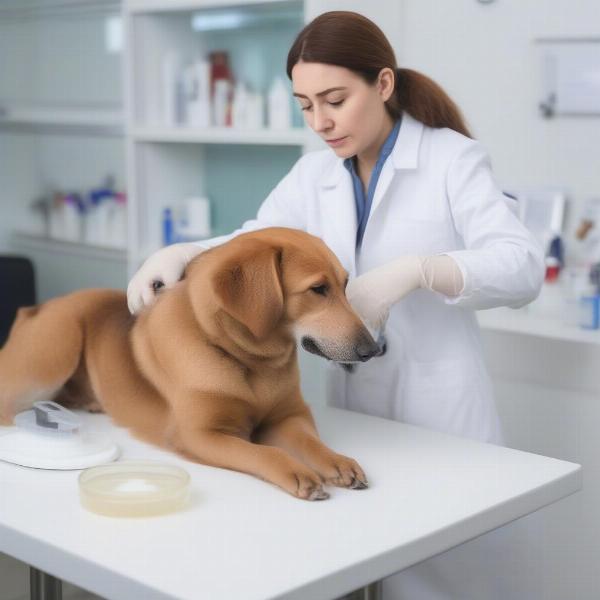If your dog keeps biting his back until it bleeds, it’s a serious sign that something is wrong and needs immediate attention. This behavior isn’t normal and can indicate a range of underlying issues, from allergies to anxiety. Understanding the potential causes and knowing what to do can help you alleviate your dog’s discomfort and prevent further injury.
Why is My Dog Biting His Back Raw?
There are several reasons why a dog might excessively bite or lick their back, leading to bleeding. These range from medical conditions to psychological factors. Ignoring the behavior can lead to infections and worsening symptoms. Let’s explore some of the most common causes:
Allergies
Allergies are a frequent culprit behind excessive itching and biting. Environmental allergens like pollen, dust mites, or mold, as well as food allergies, can trigger skin irritation. Your dog might target their back specifically if that’s where the allergic reaction manifests.
Parasites
Fleas, ticks, and mites can cause intense itching, leading to frantic biting and scratching. Even if you don’t see any visible parasites, a vet can confirm their presence through skin scrapings or other tests.
Infections
Bacterial or fungal skin infections can cause localized itching and discomfort. These infections can develop secondary to allergies or parasite infestations, as the broken skin from scratching creates an entry point for pathogens.
Pain
Sometimes, back biting can be a sign of underlying pain, such as arthritis, nerve issues, or muscle strains. Your dog might be trying to alleviate the discomfort by biting the affected area.
Anxiety and Stress
Just like humans, dogs can experience anxiety and stress, which can manifest as compulsive behaviors, including excessive licking and biting. Changes in routine, separation anxiety, or loud noises can trigger these behaviors.
What Should I Do If My Dog Is Biting Its Back Until It Bleeds?
Seeing your dog in distress can be upsetting, but it’s crucial to address the issue promptly and effectively. Here’s what you should do:
- Consult a Veterinarian: This is the most crucial step. A vet can diagnose the underlying cause of the biting and recommend appropriate treatment. Don’t attempt to self-treat, as this could worsen the condition.
- Prevent Further Injury: Use an Elizabethan collar (also known as a cone) to prevent your dog from reaching the affected area and causing further damage.
- Keep the Area Clean: Gently clean the wound with warm water and a mild antiseptic solution recommended by your vet.
- Follow Your Vet’s Instructions: Adhere to any prescribed medications or treatments, such as antihistamines, antibiotics, or topical creams.
 Veterinarian examining a dog's skin
Veterinarian examining a dog's skin
How Can I Prevent My Dog From Biting His Back?
Preventing future episodes of excessive back biting involves addressing the underlying cause. Here are some preventative measures:
- Regular Parasite Control: Use preventative medications year-round to protect your dog from fleas, ticks, and mites.
- Manage Allergies: Identify and eliminate allergens from your dog’s environment, and consider allergy testing and immunotherapy if necessary.
- Provide a Stress-Free Environment: Create a calm and predictable routine for your dog, and offer plenty of opportunities for exercise and enrichment to reduce anxiety.
- Regular Grooming: Brush your dog regularly to remove loose fur and dirt, and monitor their skin for any signs of irritation.
- Healthy Diet: Feed your dog a balanced and nutritious diet to support healthy skin and coat.
Conclusion
If your dog keeps biting his back until it bleeds, it’s a sign of an underlying problem that requires veterinary attention. By addressing the root cause and implementing preventative measures, you can help your dog live a happier, healthier, and itch-free life. Don’t delay seeking professional help; prompt action is key to preventing further complications and ensuring your furry friend’s well-being.
FAQs
- Can stress cause a dog to bite its back? Yes, anxiety and stress can manifest as compulsive behaviors like excessive licking and biting.
- What are the signs of a skin infection in dogs? Redness, swelling, hair loss, pus, and a foul odor are common signs of a skin infection.
- How often should I give my dog flea and tick medication? Consult your vet for the appropriate frequency, as it varies depending on the product and your dog’s lifestyle.
- Is it safe to use human antihistamines on my dog? Never give your dog human medication without consulting a vet, as some can be toxic to animals.
- What should I do if my dog’s back is bleeding? Clean the wound gently and contact your veterinarian immediately.
- How can I tell if my dog has allergies? Common signs of allergies in dogs include itching, skin redness, hair loss, and ear infections.
- Can a change in diet help with skin issues? Yes, a balanced and nutritious diet can contribute to healthy skin and coat.
ILM Dog is a leading international online resource dedicated to providing expert advice on dog care and wellbeing. We cover a wide range of topics, from breed selection and health to training, nutrition, and grooming. Our articles are written by experienced professionals and designed to help dog owners around the world provide the best possible care for their furry companions. Whether you’re a new dog owner or a seasoned expert, ILM Dog is your go-to source for reliable and practical information. For any inquiries, please contact us at [email protected] or +44 20-3965-8624. Visit ILM Dog today for more valuable insights into dog care.